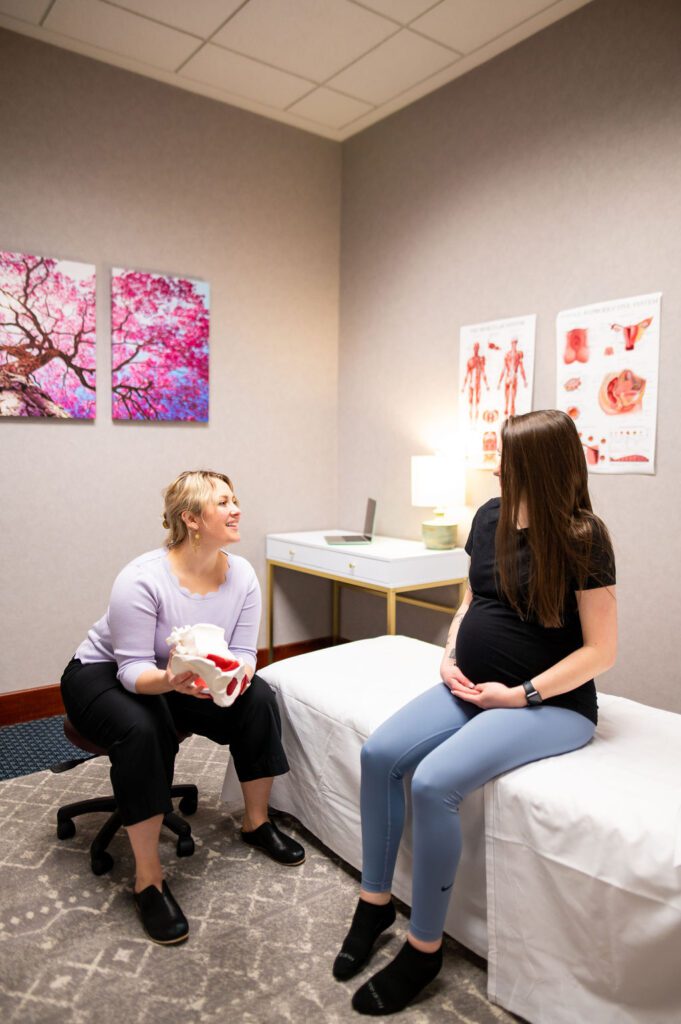You’ve prepared for what to expect in pregnancy and birth. You’ve done it, you had a baby! Now what? What is normal? Who can help you navigate this new season?
It’s common for women to be so focused on a healthy pregnancy/birth that we don’t give ourselves much time to think about what to expect postpartum. The early stage of postpartum recovery can be a wild ride! New moms are going through changes physically, emotionally and relationally. It is easy to feel overwhelmed and uncertain about the changes that are occurring.
 Physically the common changes we see initially are things like sharp uterine pains, difficulty controlling our body temperature, vaginal bleeding, and pain at various places in our bodies.
Physically the common changes we see initially are things like sharp uterine pains, difficulty controlling our body temperature, vaginal bleeding, and pain at various places in our bodies.
Our uterus is slowly contracting back down to a smaller size (from the size of a watermelon at the end of pregnancy back to the size of a lemon pre-pregnancy). These pains can intensify during breastfeeding due to hormones being released. These pains can also be more noticeable with consecutive births. This is normal and lasts for the first few weeks.
You may have difficulty with regulating your body temperature due to changes in hormones. This can cause things like night sweats one moment, completely soaking through your PJs and throwing off all the blankets and then teeth chattering chills the next moment.
You can expect vaginal bleeding for up to 4-6 weeks which is called lochia. This is the body’s way to get rid of extra tissues in the uterus that were needed for the baby’s growth. It doesn’t matter how you give birth, vaginally or a Cesarean birth, all people will experience vaginal bleeding after birth. Have your pads ready!
Pain or discomfort can occur after birth. This pain can come from healing scars in the abdomen or perineum or from the perineum being stretched. You want to get the scar and painful area moving but how and when to address the area can be tough to navigate safely. Seeing a pelvic health therapist can assess your personal healing timelines and teach you how to best support the area. This allows improved healing and reduction of pain.
Pain can also present in other areas of our bodies, not just in the pelvic girdle. Thoracic and neck pain are common from the feeding journey. No matter how you feed your baby it can be a pain in the neck physically! New Moms find themselves in prolonged hunched over postures when feeding that can lead to pain. A pelvic health therapist can help reduce muscle and joint tension to alleviate pain, teach you specific ergonomic strategies and show you specific exercises to keep the pain away.
Postpartum individuals can also experience low back pain from weakened core and repetitive movement. Did you imagine you’d be doing 1000 squats and hip hinges a day postpartum? It sure feels like it when putting the baby in a car seat, bassinet, floor mat, changing tables etc. This can be hard for a body that has just been through so much in birth. A pelvic floor therapist can help! We will assess your overall core strength, back mobility, check for any abdominal separation, look at your rib positioning and form with movement.
There are so many changes happening in the early stages of postpartum recovery. Seeing a pelvic health therapist can help you navigate those physical changes to improve your healing and equip you with the right tools to confidently maneuver this new season.
Be Proactive About your Postpartum Recovery
We are passionate about helping women prepare for the birth of their babies and helping moms navigate the postpartum period. Call our clinic to see how we can help you or to inquire about our Pregnancy Prep and Postpartum Recovery Programs.
Learn about our Pregnancy Prep & Postpartum Programs
By Dr. Jesse Rapp
